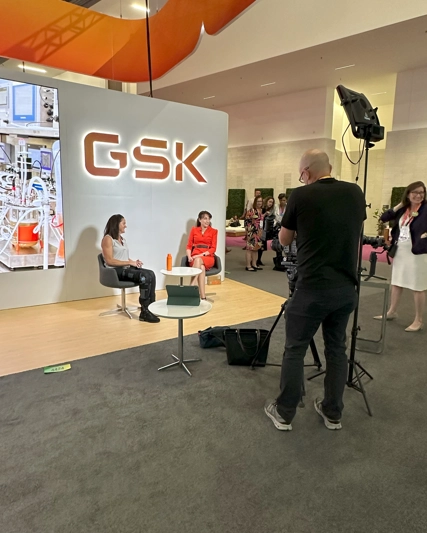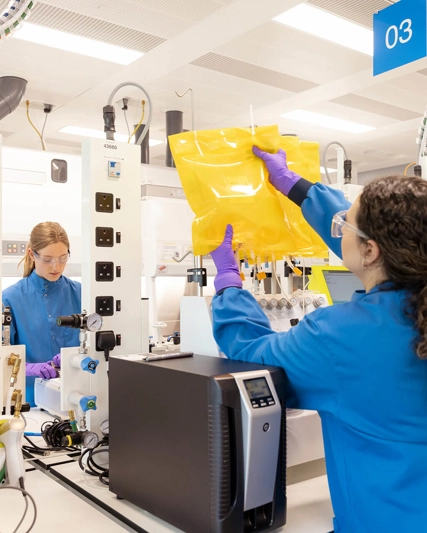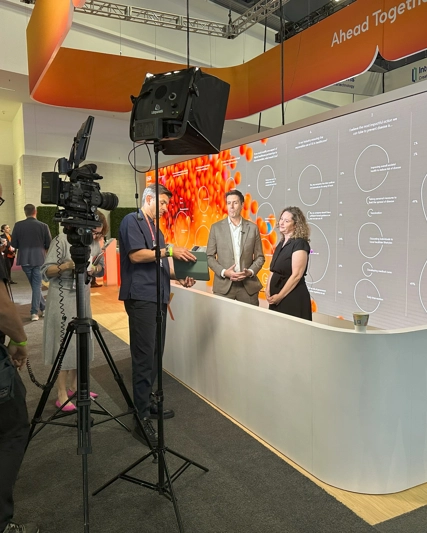Issued: Philadelphia, PA
For media and investors only
GSK presents positive data for AREXVY, its respiratory syncytial virus (RSV) vaccine, indicating protection over three RSV seasons
- GSK’s RSV vaccine is the only RSV vaccine with efficacy and safety data available through three full seasons, including in people at increased risk
- Safety and reactogenicity data are consistent with previous results from the phase III program
- GSK will continue to provide data on longer-term follow-up to help recommending bodies determine future revaccination schedules
GSK plc (LSE/NYSE: GSK) today announced new data from the AReSVi-006 (Adult Respiratory Syncytial Virus) phase III trial evaluating the efficacy and safety of a single dose of AREXVY (Respiratory Syncytial Virus Vaccine, Adjuvanted) against lower respiratory tract disease (LRTD) caused by respiratory syncytial virus (RSV) in adults aged 60 years and older, including those at increased risk, over three full RSV seasons (NCT04886596).0F1 These data will be presented today at the CHEST 2024 Annual Meeting, organized by the American College of Chest Physicians.
AREXVY is the world’s first RSV vaccine and was approved based on exceptional efficacy in adults aged 60 and older including those who are at increased risk due to certain underlying medical conditions. Today's results indicate that after a single dose of GSK’s RSV vaccine, cumulative efficacy over three full RSV seasons was clinically meaningful at 62.9% against RSV-LRTD (97.5% CI, 46.7-74.8, 48 of 12,468 vs 215 of 12,498) and 67.4% against severe RSV-LRTD (95% CI, 42.4-82.7, 15 of 12,468 vs 75 of 12,498) compared to placebo. In the third season, the vaccine’s efficacy was 48.0% against RSV-LRTD (95% CI, 8.7-72.0, 16 of 4,988 vs 61 of 10,031). Safety and reactogenicity data were consistent with previous results from the phase III program. In season one, the vaccine was generally well tolerated. The most frequently observed adverse events were pain at the injection site, fatigue, myalgia, headache, and arthralgia within four days of vaccination.
These results include efficacy against different RSV subtypes, in adults with advancing age (70-79 years of age), and those with certain underlying medical conditions. Since RSV can exacerbate medical conditions and potentially lead to hospitalizations, cumulative efficacy over three RSV seasons has the potential for significant health impact. It has the potential to offer health care professionals flexibility to administer the vaccine year-round. Over time, revaccination is expected to be required to maintain an optimal level of protection. GSK will continue to share efficacy and immune response data, including on revaccination, with recommending bodies to inform decisions on immunization schedules and future revaccination.
RSV is a common, contagious virus affecting the lungs and breathing passages and impacts an estimated 64 million people of all ages globally every year.1 Adults can be at increased risk for RSV disease due to comorbidities, immune compromised status, or advanced age. RSV can exacerbate multiple conditions, including COPD, asthma, and chronic heart failure, and can lead to severe outcomes, such as pneumonia, hospitalization, and death.3 Each year in the US, approximately 177,000 adults 65 years and older are hospitalized due to RSV and an estimated 14,000 of those cases result in death.4
Tony Wood, Chief Scientific Officer, GSK, said: “We are excited by these new data which show that a single dose of AREXVY could help protect millions of older adults at risk of RSV disease over three seasons to benefit public health. This is the only RSV vaccine with efficacy and safety data available through three full seasons. We will continue to provide data on longer term follow-up to help recommending bodies determine future revaccination schedules.”
| Endpoint | Season one efficacy* | Season two efficacy | Season three efficacy | Cumulative efficacy over three seasons** |
|---|---|---|---|---|
| RSV-LRTD |
Primary confirmatory endpoint: 6.7 months median follow- up
82.6% 96.95% CI, 57.9–94.1 7 of 12,466 vs 40 of 12,494 |
Secondary descriptive endpoint: 6.3 months median follow-up
56.1% 95% CI, 28.2–74.4 20 of 4,991 vs 91 of 10,031 |
Secondary descriptive endpoint: 7 months median follow-up
48.0% 95% CI, 8.7-72.0 16 of 4,988 vs 61 of 10,031 |
Secondary confirmatory endpoint: 30.6 months median follow-up 62.9% - with season as covariate*** 97.5% CI, 46.7-74.8 48 of 12,468 vs 215 of 12,498 69.1% - without season as covariate (post-hoc analysis) 97.5% CI, 55.8-78.9 48 of 12,468 vs 215 of 12,498 |
| Severe LRTD |
Secondary descriptive endpoint
94.1% 95% CI, 62.4–99.9 1 of 12,466 vs 17 of 12,494 |
Secondary descriptive endpoint
64.2% 95% CI, 6.19–89.2 5 of 4,991 vs 28 of 10,031 |
Secondary descriptive endpoint
43.3% 95% CI, -45.3-81.3 6 of 4,988 vs 21 of 10,031
|
Secondary descriptive endpoint 67.4% - with season as covariate*** 95% CI, 42.4-82.7 15 of 12,468 vs 75 of 12,498 72.3 % - without season as covariate (post-hoc analysis) 95% CI, 51.3 – 85.2 15 of 12,468 vs 75 of 12,498 |
|
RSV-LRTD in participants with at least 1 pre-existing comorbidity of interest |
Secondary descriptive endpoint
94.6% 95% CI, 65.9–99.9 1 of 4,937 vs. 18 of 4,861 |
Secondary descriptive endpoint
51.5% 95% CI, 7.4 – 76.6 12 of 1,981 vs 48 of 3,895 |
Secondary descriptive endpoint
57.8 % 95% CI, 8.0-83.0 8 of 2,000 vs 37 of 3,924 |
Secondary descriptive endpoint 64.7% - with season as covariate*** 95% CI, 45.1-78.1 25 of 5014 vs 116 of 4951 71.1% - without season as covariate (post-hoc analysis) 95% CI, 55.2 – 82.0 25 of 5014 vs 116 of 4951 |
* The absolute values are being presented vaccinated group vs placebo group.
** The vaccine efficacy is estimated using a Poisson model adjusted by age, region and season.
*** Seasonality covariate means the data have been adjusted to reflect the variability of disease incidence between different seasons.
In addition to the presentation at CHEST, the data will be submitted for scientific peer-reviewed publication and to regulators for review.
About AREXVY (Respiratory Syncytial Virus Vaccine, Adjuvanted)
AREXVY contains recombinant RSV glycoprotein F stabilized in the prefusion conformation (RSVPreF3). This antigen is combined with GSK’s proprietary AS01E adjuvant.
In May 2023, AREXVY was first approved by the US FDA for the prevention of lower respiratory tract disease (LRTD) caused by respiratory syncytial virus (RSV) in individuals 60 years of age and older. Since then, the vaccine has also been approved for the prevention of RSV-LRTD in individuals 60 years of age and older in 50 countries, including Europe and Japan. In addition, it is approved in the US and EU for use in individuals aged 50-59 who are at increased risk due to certain underlying medical conditions. Regulatory reviews for this extended indication are also undergoing review in other countries – including Japan. The proposed trade name remains subject to regulatory approval in other markets.
The use of this vaccine should be in accordance with official recommendations. As with any vaccine, a protective immune response may not be elicited in all vaccinees.
The GSK proprietary AS01 adjuvant system contains QS-21 STIMULON adjuvant licensed from Antigenics Inc, a wholly owned subsidiary of Agenus Inc.
Indication for AREXVY
AREXVY is a vaccine indicated for active immunization for the prevention of lower respiratory tract disease (LRTD) caused by respiratory syncytial virus (RSV) in:
- Individuals 60 years of age and older;
- Individuals 50 through 59 years of age who are at increased risk for LRTD caused by RSV.
Important Safety Information for AREXVY
- AREXVY is contraindicated in anyone with a history of a severe allergic reaction (eg, anaphylaxis) to any component of AREXVY
- Appropriate medical treatment must be immediately available to manage potential anaphylactic reactions following administration of AREXVY
- Syncope (fainting) may occur in association with administration of injectable vaccines, including AREXVY. Procedures should be in place to avoid injury from fainting
- Immunocompromised persons, including those receiving immunosuppressive therapy, may have a diminished immune response to AREXVY
- In adults 60 years of age and older, the most commonly reported adverse reactions (≥10%) were injection site pain (60.9%), fatigue (33.6%), myalgia (28.9%), headache (27.2%), and arthralgia (18.1%)
- In adults 50 through 59 years of age, the most commonly reported adverse reactions (≥10%) were injection site pain (75.8%), fatigue (39.8%), myalgia (35.6%), headache (31.7%), arthralgia (23.4%), erythema (13.2%), and swelling (10.4%)
- There are no data on the use of AREXVY in pregnant or breastfeeding individuals. AREXVY is not approved for use in persons <50 years of age
- Vaccination with AREXVY may not result in protection of all vaccine recipients
Please see full Prescribing Information for AREXVY.
About AReSVi-006
This is a randomized, placebo-controlled, double-blind, multi-country phase III trial to demonstrate the efficacy of a single dose of GSK's adjuvanted RSV older adult vaccine over three years and following an annual revaccination schedule in adults aged 60 years and above compared to a placebo arm. About 25,000 participants have been enrolled from 17 countries. The trial’s primary endpoint was vaccine efficacy against RSV-LRTD after one RSV season. Results were published in the New England Journal of Medicine in February 2023.5
After the first season, 12,469 participants in the vaccine arm were re-randomized to receive either the RSV vaccine or placebo and were followed up for occurrence of RSV-LRTD. Vaccine efficacy of a single dose against RSV-LRTD after two and three RSV seasons compared to placebo and vaccine efficacy after annual revaccination compared to placebo were confirmatory secondary endpoints.
About GSK
GSK is a global biopharma company with a purpose to unite science, technology, and talent to get ahead of disease together. Find out more at gsk.com.
Cautionary statement regarding forward-looking statements
GSK cautions investors that any forward-looking statements or projections made by GSK, including those made in this announcement, are subject to risks and uncertainties that may cause actual results to differ materially from those projected. Such factors include, but are not limited to, those described under Item 3.D “Risk factors” in GSK’s Annual Report on Form 20-F for 2023, and GSK’s Q2 Results for 2024.
References
Clinicaltrials.gov, “Efficacy Study of GSK's Investigational Respiratory Syncytial Virus (RSV) Vaccine in Adults Aged 60 Years and Above”. Available at: https://clinicaltrials.gov/study/NCT04886596 - last accessed: September 2024.
National Institute of Allergy and Infectious Diseases, Respiratory Syncytial Virus (RSV). Available at: https://www.niaid.nih.gov/diseases-conditions/respiratory-syncytial-virus-rsv – last accessed: September 2024.
Centers for Disease Control and Prevention (CDC), RSV in Older Adults, 2024. Available at: https://www.cdc.gov/rsv/older-adults/index.html - Last accessed: September 2024.
Falsey AR, Hennessey PA, Formica MA, Cox C, Walsh EE. Respiratory syncytial virus infection in elderly and high-risk adults. N Engl J Med. 2005 Apr 28;352(17):1749-59. doi: 10.1056/NEJMoa043951. PMID: 15858184.
Papi A. et al, “Respiratory Syncytial Virus Prefusion F Protein Vaccine in Older Adults”, in New England Journal of Medicine, 2023;388:595-608
DOI: 10.1056/NEJMoa2209604.


